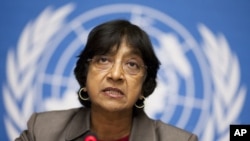The U.N. High Commissioner for Human Rights, Navi Pillay, is calling for the Egyptian government to change the system that has led to widespread human-rights abuse. She says she is alarmed by the sharp rise in casualties and is appealing to the army and police to show restraint during Tuesday’s protest march.
The U.N. Human Rights Chief, Navi Pillay says casualties have been mounting on a daily basis since protests against President Hosni Mubarak’s 30-year rule erupted a week ago.
She says her office has received unconfirmed reports that as many as 300 people may have died in protest-related violence, more than 3,000 injured and hundreds arrested.
Watch raw video from the streets of Egypt
Her spokesman, Rupert Colville, says the High Commissioner condemns the excessive use of force and is calling for a full investigation into the role of security forces in the violence that has occurred during the past few days.
Colville says the long-term abuse suffered by the Egyptian people is a key factor in the protests.
“The population appears to be clearly rejecting a system that has deprived people of fundamental rights, and has committed a range of serious abuses, including widespread acts of torture," he said. "The High Commissioner believes the Egyptian Government, by maintaining an emergency law for 30 years, has clearly shown that human rights have not been one of its prime concerns.”
The emergency law was enacted in 1981, following the assassination of President Anwar Sadat. It has never been lifted. Colville notes the emergency law has enabled the security forces and other state institutions to violate the rights of the people at will.
He says the High Commissioner is deeply concerned about the security vacuum that developed during the weekend after the police were withdrawn from the streets.
“I think she shares with many others the extreme surprise when the police totally evaporated in that way, particularly at a time when the president was emphasizing that it was important the country did not descend into chaos," said Colville. "In terms of allegations that are out there, I think only an investigation can really answer that, but clearly there are very big questions to answer about they-why did it happened. Who ordered it, it clearly was ordered, because it apparently was pretty uniform throughout the country. So, what was the purpose of that.”
High Commissioner Pillay calls the popular movement in Egypt, unprecedented in recent decades. She says the protests are likely to be a pivotal moment in Egypt’s transition to a freer, fairer and more democratic society.
Pillay is also calling for the government to stop interfering with communications, Internet and transport systems. She also calls for an end to the harassment of individual journalists and media organizations such as al-Jazeera.













